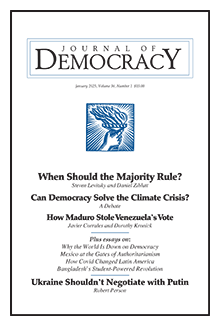
When Should the Majority Rule?
With illiberal forces ascendant across the globe, protecting individual liberties and the democratic process is crucial. But when institutions empower minority groups over the majority, can democracy survive?

Volume 36, Issue 1

With illiberal forces ascendant across the globe, protecting individual liberties and the democratic process is crucial. But when institutions empower minority groups over the majority, can democracy survive?

Many pundits cry for a negotiated settlement to end the war between Russia and Ukraine. But they misunderstand Vladimir Putin’s motives. The only just end to the war will be in the trenches, not at the bargaining table.

Nicolás Maduro brazenly stole Venezuela’s 2024 presidential election, despite a free, fair, and transparent ballot count that showed a clear opposition victory. Why would an autocrat want to maintain one of the world’s best voting systems?

The country’s outgoing president relentlessly attacked Mexico’s democratic institutions, taking it to the brink of authoritarianism. His successor is poised to push its democracy over the edge.

The student movement that toppled Bangladesh’s longtime autocratic ruler wants more than a return to the old order. These young revolutionaries are seizing a chance to start anew. How and by whom will the country’s future be decided?

The 2024 election led to a dramatic changing of the guard, ushering in new political leaders and ousting dynastic elites. Can a new president correct the corruption and misgovernance of the past?

Citizens across the globe still value democracy, but they have become dissatisfied with the way it is working. A new era of representation is in order — one featuring more diverse leaders, responsive politicians, and empowered publics.

Covid-19 swept across Latin America with devastating effects. But it had unexpected positive consequences too, as citizens ousted inept politicians and pushed back against the inequities laid bare by the pandemic.

Even as Georgia lurches toward autocracy, the country’s pluralism and democratic culture are deepening. What can Georgia’s contradictory trends reveal about democratic resilience?

Democracy’s unique, flexible, and substantial resources make it better than authoritarianism at confronting climate change.

Climate change is an urgent and unparalleled threat. Our best hope lies in radical, principled activism — at once more democratic and more authoritarian.

The democracy versus “eco-authoritarianism” dilemma is false. The answer is more and better democracy.

Democracies — facing gridlock and polarization — often fall short. But it should be remembered that dictatorships do even more harm.

Regime type is important, but it is the power of the fossil-fuel industry in both autocracies and democracies that is blocking the green transition globally.

The authors identify and respond to four broad themes in the Climate Crisis debate.
A review of The Troublemaker: How Jimmy Lai Became a Billionaire, Hong Kong’s Greatest Dissident, and China’s Most Feared Critic, by Mark L. Clifford.
A Hong Kong prodemocracy activist’s statement upon her sentencing; Georgia’s president denounces the election results; Alaa Abd el-Fattah was named Writer of Courage and joint recipient of the 2024 PEN Pinter Prize; an open letter for Xu Zhiyong; and a Nigerian senator condemns the arrests of youth protesters.